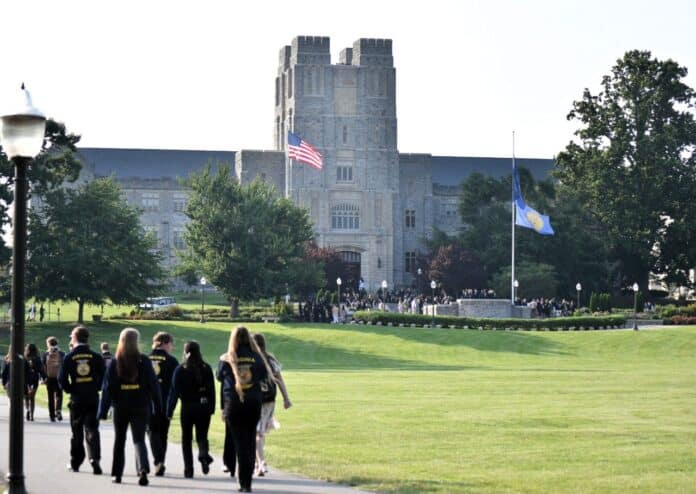When first-year student Grayson Long walks across Virginia Tech’s Blacksburg campus, she knows she’s treading the same ground where the organization that shaped her life first began.
A past Virginia FFA president, Long is part of a new generation carrying forward a legacy of agricultural leadership born a century ago just steps away from the Drillfield.
“FFA opened up opportunities for me that I never imagined,” Long said. “Being a student on the campus where it started gives me a real sense of pride and reminds me every day how many lives it has touched.”
This fall marks 100 years since four Virginia Tech agricultural educators founded the Future Farmers of Virginia, a youth organization designed to empower rural students through education and leadership. Their vision laid the foundation for today’s National FFA Organization, which includes more than 1 million members in 9,400 chapters across all 50 states, Puerto Rico, and the U.S. Virgin Islands, including more than 14,000 in Virginia.
Based at Virginia Tech through Virginia Cooperative Extension, Virginia FFA connects the university’s land-grant mission with hands-on agricultural education that fuels Virginia’s $105 billion agriculture and forestry economy.
As FFA enters its second century, its mission remains as urgent as ever: cultivating the next generation of agricultural leaders who will sustain a growing world.
“Everywhere you turn — the food you eat, the clothes you wear, the fuel you use — it all ties back to agriculture,” Long said. “It touches everyone’s life, and that’s what makes it such meaningful work.”
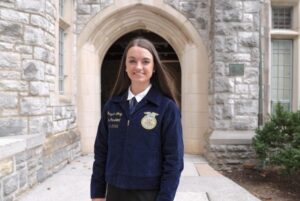
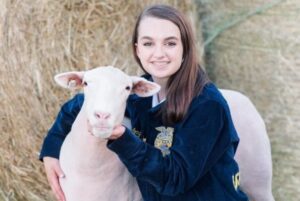
A passion sparked
Long’s path into agriculture began in sixth grade, when she joined Virginia FFA in Rockingham County and started raising two sheep at a nearby farm. As her interest grew, she persuaded her family to leave the suburbs to start a farm of their own.
Today, she manages 75 purebred Dorset and Southdown sheep, selling show lambs to 4-H and FFA members across Virginia. Her family — who had moved away from farming after her grandparents’ generation — is also raising commercial turkeys.
As Virginia FFA president for the 2024–25 term, Long represented youth in agriculture statewide — visiting chapters, meeting industry leaders, and building skills she’ll carry for life.
Now a student in the School of Animal Sciences, she is studying animal and poultry sciences and plans to specialize in livestock nutrition.
“FFA showed me where I belonged,” she said. “It helped me discover agriculture as more than a class or competition. It’s a way of life and a way to serve others.”
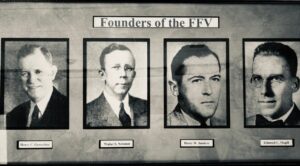
From the Drillfield to the nation
In September 1925, four Virginia Tech agricultural educators — Henry Groseclose, Walter Newman, Harry Sanders, and Edmund Magill — met around an oak table inside Agricultural Hall, where the university bookstore now stands.
Concerned that rural students seemed “to have a feeling of inferiority” compared to their urban peers, they set out to build confidence, leadership, and pride in agricultural education. They called their new organization the Future Farmers of Virginia.
The idea caught on quickly. At the first statewide rally in 1926, members voted to form a state organization. By 1927, Virginia had chartered its first official chapter at Weyers Cave High School. A year later, Virginia’s model went national with the founding of Future Farmers of America in Kansas City, where Virginia proudly received the first state charter.
The founders’ vision — combining classroom instruction, hands-on agricultural experience, and student leadership — became the national standard for agricultural education and still drives FFA’s mission today.
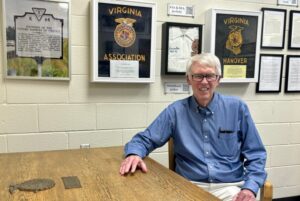
Preserving Virginia Tech’s role in FFA history
Few people know that story better than John Hillison, professor emeritus and former head of the Department of Agricultural and Extension Education. His start in FFA, as a student officer in northern Illinois, set him on a lifelong path as an educator and advocate for agricultural leadership.
When Hillison arrived at Virginia Tech in 1976, he was surprised how few people knew that FFA was founded on the Blacksburg campus.
“I realized the university wasn’t getting the credit it deserved,” he said. “Something needed to be done.”
Hillison has worked to preserve that heritage through the FFA Historical Room he curates in Litton-Reaves Hall. The room holds more than 100 donated artifacts that tell the story of the organization’s evolution, including photographs, chapter charters, blue corduroy jackets, and audio recordings from noteworthy members. The centerpiece of the collection is the oak table where the founders gathered in 1925.
“If Groseclose, Sanders, Newman, and Magill could see this now, they would be amazed,” Hillison said. “They wanted to prepare young people for leadership in agriculture, and they would be proud to see more than a million members carrying their vision forward.”
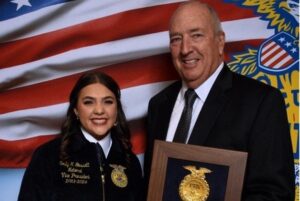

Virginia’s continuing influence
When Andy Seibel ’85, M.S. ’86, Ed.S. ’05 first put on the blue corduroy jacket as a middle schooler in Botetourt County, he had no idea how deeply FFA would shape his life. Inspired by his agriculture teachers, he went on to teach agriculture and advise an FFA chapter before devoting his career to helping students find their place in the industry.
Now the chief executive of Virginia FFA and an Extension specialist in youth development through agriculture, Seibel guides the next generation of leaders in Virginia’s largest private industry.
“The connection between this university and our state’s agricultural future couldn’t be stronger,” Seibel said.
Each year, thousands of students take agricultural classes, and many first experience Virginia Tech through FFA events on campus. The Virginia FFA State Convention draws approximately 3,000 students to Blacksburg every summer. Across the commonwealth, 327 advisors teach more than 38,000 students in agriculture programs connected to FFA and the many career paths it opens.
“Multiply that by a century, and you see how many Virginians have been introduced to agricultural leadership through FFA,” Seibel said. “It continues to open doors to hundreds of careers and to strengthen the industry that feeds us all.”


Many of those leaders trace their roots to both Virginia FFA and Virginia Tech, including Joseph Guthrie ’89, commissioner of the Virginia Department of Agriculture and Consumer Services, and Matt Lohr ’95, Virginia’s secretary of agriculture and forestry.
Lohr grew up on a family farm in the Shenandoah Valley and said FFA service projects helped spark his passion for serving others. He held roles as both Virginia state FFA president and national FFA vice president before graduating from Virginia Tech.
“Having opportunities to meet with President George Bush, governors, and members of Congress inspired me to pursue a career that combined a love of agriculture with a calling to serve my state and nation,” Lohr said. “So many of our agricultural, political, business, community, and military leaders developed their talents and skills while wearing the blue and gold. Our nation is a better place because of their service, dedication, and achievements.”
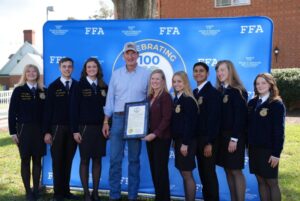
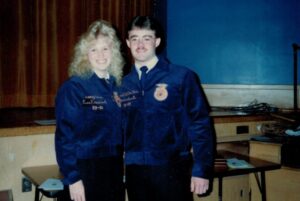
The department behind FFA’s founding
The department that helped launch the Future Farmers of Virginia lives on today as the Department of Agricultural, Leadership, and Community Education. What began as a vocational education program now equips students to lead in classrooms, agricultural organizations, and communities worldwide.
“Virginia Tech has always been at the heart of FFA’s story,” said Tracy Rutherford, professor and head of the department. “This anniversary reminds us that the land-grant values of leadership, innovation, and service that guided those early educators still guide our work today.”
Rutherford, a former FFA member from New York, said that the principles behind the FFA the department prepares future agricultural leaders. Students gain real-world experience through classroom teaching, Extension partnerships, and hands-on community engagement.
“The FFA motto, ‘Learning to Do, Doing to Learn, Earning to Live, Living to Serve,’ even echoes Virginia Tech’s own Ut Prosim (That I May Serve),” Rutherford said. “These shared missions began in Blacksburg and continue to grow nationwide.”
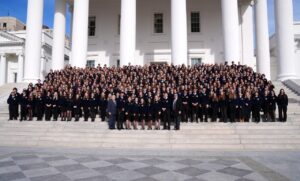
A centennial celebration
In June, Virginia Tech will welcome thousands of students back to the place where it all began for the 100th Virginia FFA State Convention. The milestone event will celebrate a century of agricultural leadership rooted at Virginia Tech and the generations who continue to grow from its legacy.
For Long, it will be a full-circle moment: a chance to stand where FFA’s story began and reflect on how it shaped her own.
“Even if you didn’t grow up on a farm, there’s a place for you in agriculture,” she said. “That’s what FFA teaches — that everyone has a role in feeding, clothing, and serving their communities.”
By Marya Barlow

